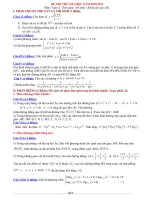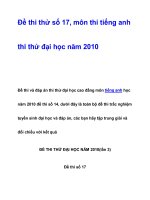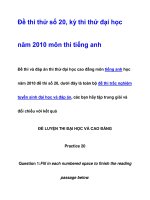Đề thi thử số 17, môn thi tiếng anh thi thử đại học năm 2010 pptx
Bạn đang xem bản rút gọn của tài liệu. Xem và tải ngay bản đầy đủ của tài liệu tại đây (132.18 KB, 24 trang )
Đề thi thử số 17, môn thi tiếng anh
thi thử đại học năm 2010
Đề thi và đáp án thi thử đại học cao đẳng môn tiếng anh học
năm 2010 đề thi số 14, dưới đây là toàn bộ đề thi trắc nghiệm
tuyển sinh đại học và đáp án, các bạn hãy tập trung giải và
đối chiếu với kết quả
ĐỀ THI THỬ ĐẠI HỌC NĂM 2010(lần 3)
Đề thi số 17
Question 1:Fill each gap with one suitable word.
Watching TV and going for walks 1 the most popular leisure
activities in 2 But although longer holidays and shorter 3 hours
have given people more free 4 women generally have less free
time 5 men,because they spend time 6 domestic work,
shopping, and child care 7 survey showed that men were
more 8 to read newspapers than women,while 9 slightly higher
proportion of adults read 10 newspapers than read daily morning
national 11 More people are taking holidays abroad. 12 1971
only 36 percent of 13 in Britain had been abroad on 14 ,but by
1983 this proportion had 15 to 62 percent-nearly fifteen million
people.
Question 2:Supply the correct form of the verb in brackets.
1,He met his friend while he ( drive ) home.
2,I (stay ) here until he (come ) tomorrow.
3,Our living conditions (be) much better in the future.
4,When the war (end) we (live )in London.
5,Tomorrow,when you go into the office, Mrs Green (sit )at the
front desk.
6,It’s ages since Tom (visit ) us.
7,This is the best wine I ever (drink ).
8,When she (sing ) her song, she (sit )down.
9,When she arrived, I (wait ) for two and half an hour.
10,Linda is from Australia. Now she (travel) round Europe. She
(begin ) her town three months ago. She (travel ) around Europe
for three months and she (visit ) six countries so far.
Question 3:Rewrite these sentences, using word(s) given.
1,Jane’s car was repaired yesterday. /
Jane………………………………………………………………………
….
2,He did not say a word when he left the room. / He
left…………………………………………………………….
3,Reading scientific books is one of my interests. / I
am…………………………………………………………….
4,Apples are usually cheaper than oranges. /
Oranges……………………………………………………………
5,A train leaves at eight o’clock every morning. / There
is…………………………………………………………
6,I met him for the first time in 1997. / I had
not………………………………………………………………………
7,John smoked cigarettes when he was a young man. / John
used……………………………………………….
8,Jane’s parents gave her a nice gift on her birthday. /
Jane……………………………………………………….
9,Unless he phones his wife immediately, he won’t get any
information. / If……………………………………
10,I could hardly understand what he said. / I
understood………………………………………………………….
Question 4: Make all the changes and additions necessary to
complete the following sentences.
1,Yuri Gagarin / first / man / travel / space.
2,What / man / wear / when / you / see / him ?
3,We / wish / have / more / time / last night
4,John / allow / daughter / swim / friend.
5,important / you / do / exercises / before / class.
Question 5:Choose the best answer a, b, c or d to complete
the following sentences.
1,I have told you…… not to do that. .
a-a hundred time b-hundred times c-many hundreds
times d-hundreds of times
2,………is missing from the shelf. Who has taken it ?
a-One of book b-One of a book c-One of
books d-One of the books
3,………such a fantastic story.
a-Rarely have I heard b-Rarely I have heard c-I rarely do
hear d-I do rarely hear
4, “Has Jane arrived yet ? “ + “No, she………an hour ago.”
a-must have gone b-should have come c-had better
come d-was supposed to come
5,”I think I understand his point.” +
“Then……………………………………….”
a-explain it to me b-explain me to it c-explain it for
me d-explain for me it
6, “Would you like some refreshment ?” +” I wouldn’t mind
having………….”
a-little b-a few c-a little d-few
7,Don’t get off the bus…… it is still moving.
a-whenever b-until c-while d-in case
8,The price of petrol has……up again.
a-risen b-got c-gone d-stood
9,We walked across the fields without………shoes on.
a-no b-any c-some d-of
10,Is Indian tea very different……….Chinese tea ?
a-as b-like c-of d-from
Question 6: Fill in each blank with the right form of the word
in brackets.
The Cotswolds is a beautiful area in England. It has a number
of 1 (crowd) villages and small towns with lonely old buildings
that have remained 2 (change) since the area was a
popular 3 (commerce) center several centuries ago. The
countryside in the area is 4 (charm) and most of the buildings
there are made from an 5 (attract) type of light stone that is
particular to the Costwolds.
Question 7:Read the reading passage and then choose the
best answer a, b, c or d.
One mystery about elephants that seems to have been solved is
how elephants communicate with each other. Humans have
heard a whole variety of sounds coming from elephants, but these
sounds are not the only way that elephants communicate.
A new explanation about elephant communication is being
proposed. Elephants vibrate the air in their trunks and foreheads.
The sound that is created during this vibration has an extremely
low pitch; the pitch, in fact, is so low that humans cannot hear it.
However, it seems that other elephants can and do hear and
understand these low rumblings.
1,The passage mainly discusses………………….
a-the answer to a question about how elephants communicate. b-
how elephants vibrate the air in their trunk
c-communication between animals and humans. d-the sounds
that elephants make.
2,According to the passage, people…………………
a-cannot hear many elephant sounds. b-are not interested in
elephant sounds.
c-hear only one elephant sound. d-can hear numerous
elephant sounds.
3,It can be inferred from the passage that the elephant sounds
that humans hear are………………
a-one of the ways that elephants communicate. b-not part of
elephant communication.
c-how elephants communicate with humans. d-the only
sounds that elephants make.
4,Where do elephants vibrate the air ?
a-In their foreheads b-In their trunks c-In their
mouths d-a and b
5,Which of the following is NOT true about the extremely low
sound created by elephants ?
a-Humans can’t understand it. b-Humans hear it. c-Elephants
hear it d-Elephants understand it.
6,The word “rumblings “ in line7 means………
a-words b-ears c-vibrations d-trunks
Question 8: choose the best answer a, b, c or d which has
the underlined part pronounced differently from the others.
1,a-pudding b-put c-pull d-puncture
2,a-absent b-recent c-decent d-present
3,a-promise b-devise c-surprise d-realise
4,a-liable b-livid c-revival d-final
5,a-bush b-brush c-bus d-cup
Question 9: Find the word which has the main stress syllable
different from the others in each group.
1,a-petroleum b-resource c-occur d-anger
2,a-producer b-consume c-companion d-situation
3,a-attract b-descend c-noticeable d-control
4,a-widespread
b-anxiety c-explode d-alternative
5,a-direction b-community c-garbage d-utility
Question 10:Choose the best answer a, b, c or d to complete
these sentences.
1,Call an ambulance. There’s been……….
a-accident accident b-an accident c-some
accident d-any accident
2,”Where are you going? “ +I’m going to buy…………
a-a bread b-any bread c-loaf of bread d-some
bread
3,Sandra works at a big hospital. She’s………. a-nurse b-a
nurse c-the nurse d-an nurse
4,She works six days………week. a-in b-for c-a
d-x { x = nothing}
5,………is a star. a-Sun b-A sun c-The
sun d-Suns
6,What did you have for…… breakfast this morning ? a-x
b-a c-an d-the
The end !
Key 17(
Question 1:
1-are 2-Britain 3-working 4-time 5-than 6-on 7-
The 8-likely 9-a 10-Sunday
11-newspapers 12-In 13-adults 14-holiday 15-
risen
Question 2:
1-was drivimg 2-shall stay / comes 3-will be
4-ended / were living 5-will be sitting
6-visited 7-have ever drunk 8-had sung /
sat 9-had been waiting
10-is travelling / began / has been travelling / has visited
Question 3:
1,Jane had her car repaired yesterday.
2,He left the room without saying a word.
3,I am interested in reading scientific books.
4,Oranges are more expensive than apples.
5,There is an eight o’clock train every morning.
6,I had not met him until 1997.
7,John used to smoke when he was young.
8,Jane was given a nice gift on her birthday by her parents.
9,If he doesn’t phone his wife immediately, he won’t get any
information.
10,I understood very little what he said.
Question 4:
1,Yuri Gagarin was the first man to travel the space.
2,What was the man wearing when you saw him ?
3,We wish we had had more time last night.
4,John allowed his daughter to swim with her friend.
5,It is very important for you to do exercises before you go to
class.
Question 5:
1-d 2-d 3-a 4-b 5-a 6-a 7-c 8-c 9-
b 10-d
Question 6:
1-crowded 2-unchanged 3-commercial 4-charming
5-attractive
Question 7:
1-a 2-d 3-a 4-d 5-b 6-c
vibrate [vai'breit] làm cho chuyển động
rumbling tạo ra tiếng ầm
Question 8:
1-d 2-d 3-a 4-b 5-a
1,a-pudding b-put c-pull d-puncture lç
thñng
2,a-absent b-recent ‘ri:snt
c-decent‘di:snt
khu«n phÐp
d-present
3,a-promise s
b-devise z c-surprise z d-realise z
4,a-liable ai b-livid i c-revival ai d-final ai
5,a-bush b-brush c-bus d-cup
Question 9:
1-d 2-d 3-c 4-a 5-c
1,a-pe’troleum b-re’source c-o’ccur d-‘anger
2,a-pro’ducer b-con’sume c-com’panion
s¸ch HD
d-,situ’ation
3,a-a’ttract b-de’scend c-‘noticeable d-con’trol
4,a-‘widespread
b-an’xiety
[æη'zaiəti]
c-ex’plode d-al’ternative
5,a-di’rection b-com’munity c-‘garbage d-u’tility
Petroleum [pə'trouliəm] Dầu mỏ(n) dầu hoả utility [ju:'tiləti]
thực tiễn
consume [kən'sju:m] tiêu thụ
Question 10:
1-b 2-d 3-b 4-c 5-c 6-a









